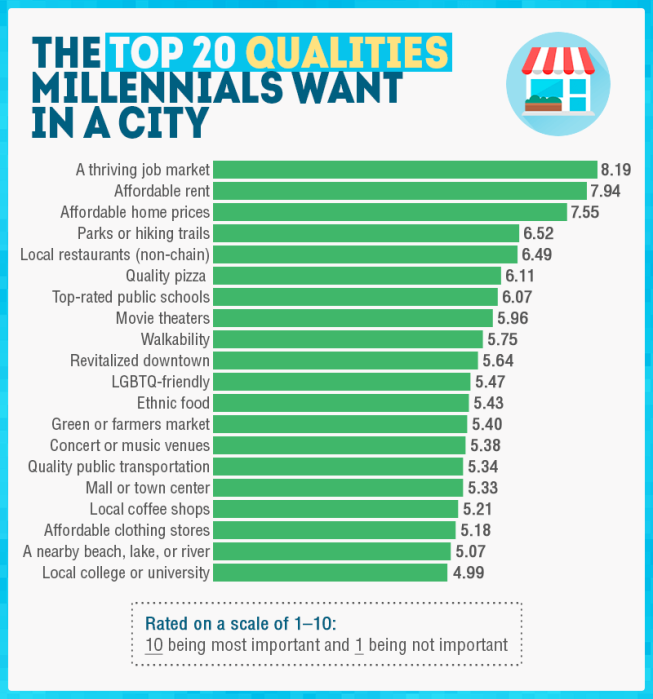Can we please stop obsessing over millennials, their hoodies and their office hoverboards?The next generation has come of age, and they’re getting the online analysis treatment. But at least they were groomed for it. Enter Generation Z —aka iGen —those born between 1995-2012 currently entering the workforce in droves. For Gen Z-ers, the term “digital native” is almost quaint, and social media wasn’t a crazy new invention they adopted in high school or college — it was simply a given. Here’s what a handful of career experts who’ve worked with recent college graduates have to say about the values and professional goals of Gen Z. RELATED:Why meditation makes you more productive than multitasking
1. They’re always on For a generation reared on multiple electronic devices, it’s a given that Gen Z is tech savvy. The line between work and play isn’t just blurred, it’s basically nonexistent, suggestsLouis Gaglini, associate director of employer engagement at Boston College’s career center. “What’s different are the expectations. On my part, and on the part of employers, if I put something out on social media, and if you [students] missed it, it means you either missed it intentionally because you’re not interested, or you missed it because you’re not in the game,” says Gaglini. Though Gen Z uses various platforms — blogs, personal websites, e-portfolios, online professional networking sites and social media platforms — they consider early exposure as, if not more, important as economic gain, suggests Kelly Ahn, director of career services at The New School. “As Gen Z value community-sharing and experience-based learning, they utilize these platforms as a way to connect with people who cannot offer monetary pay but are interested in a service exchange, or with people who are interested in collaborative projects,” says Ahn. In other words, Gen Z has the tools to bypass the traditional gatekeepers, and connect directly with mentors and potential collaborators. Are you listening, aspiring entrepreneurs and creative types? RELATED:Negotiating isn’t ruthless, it’s business 2. They’re starting earlier Gen Z implicitly understands the need to curate a professional online image — even before entering the workforce. “We’re now instructing students to build a LinkedIn profile as early as their freshman or sophomore years,” says Gaglini, who notes that a LinkedIn photo booth is a standard part of career fairs (no awkwardly cropped or low resolution photos for this generation). “One trend that we see is recruiters wanting to engage with students as early as possible,” agrees Ahn. “Companies who are not well known in their industry, yet want to attract the best talent and right talent, are now using multi-pronged approaches to recruit candidates.” 3. They’re more practical — and they take more risks Gen Z had a somewhat bifurcated economic experience growing up. They came of age during a period of economic calamity — while “unicorn” startups like Facebook and Instagram made unexpected entrepreneurs billionaires before their 30th birthdays. But Z-ers are a pragmatic generation too, says Ahn.
“They saw their parents go through the Great Recession holding multiple jobs or going to school while working. They’ve also seen the evolution of entrepreneurs, where some make it big and others may carry on mixing various careers continuing their passion in subsequent projects. What is perceived to be risky or disruptive has changed for this generation,” says Ahn. 4. They know work and education are not mutually exclusive Though it’s too soon to tell, the linear progression of college-grad school-job may be going out of vogue, says Mike Sarra, the assistant vice president of enrollment at Emerson College. “One of the things I think has shifted is that students are much more interested in being able to enroll in graduate programs and also be working professionallly at the same time,” says Serra. “That’s shifted a bit, it’s not an enormous change, but it is a change. 5. They want a personalized touch Because Gen Z was basically born knowing how to Google, they expect career coaches and academic advisers to offer more than information downloads. Ahn explains, “There is a movement among career centers to rethink the current model to allow Gen Z to apply a ‘design-thinking’ approach to building their authentic careers.”
Design thinking, an outside-the-box approach to problem-solving that takes numerous solutions into account, seems like a fitting approach for a generation that isn’t bound by rigid ideas of how career trajectories “should” look. As Gen Z seems to be resourceful in finding general information online, they expect career professionals to offer personal guidance, be available online and mobile accessible. Providing interactive career advising with a humanistic touch is becoming highly desirable, while Gen Z is rejecting in-office meetings and ‘one-size-fits-all’ workshops.” 6. They don’t expect loyalty “People in career centers understand that the people graduating now will likely have as many as five or six career paths, and as many as 20 to 25 jobs before they retire. And that’s accepted,” says Gaglini. And, according to Ahn, perhaps because they don’t anticipate job longevity or stability, Gen Z tends to see other aspects of the traditional workplace — like a structured work schedule and reporting hierarchy —as unnecessary or irrelevant. Says Ahn, “This generation has a self-directed approach and appreciates result-oriented, impact-driven work. They tend to split tasks where the line between work and play blurs. Company loyalty doesn’t seem as high as in previous generations, as many Gen Z students do not expect to work for one company for many years.” Whether or not the workplace is ready for Gen Z, they are ready for it.
Is the workplace ready for Gen Z?

iStock
Another factor contributing to shift is the increasing appeal of apprenticeships, says Ahn. The Department Of Labor is trying to adapt existing programs like Euro Apprenticeship to American apprenticeship programs in various states, including New York.Says Ahn, “Many educators and career professionals recommend students not to rely on just one mentor, but assemble a group of mentors through their internship, faculty, career professionals, and peers who can provide guidance and perspectives.”
























